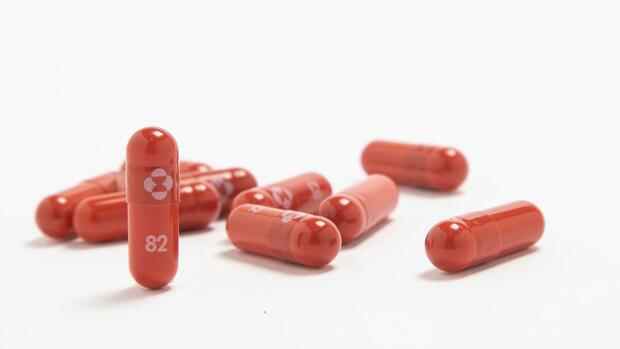Molnupiravir is the first drug against Covid that can be taken as a tablet – and thus theoretically opens up the possibility of treating many patients outside of the hospital.
(Photo: AP)
Frankfurt On Tuesday evening, an advisory committee to the US FDA voted with a narrow majority in favor of emergency approval of the active ingredient molnupiravir. At the same time, however, the advice given by the infection specialists also made it clear that the agent was clearly falling short of the initially high expectations.
The expert group only voted 13 to 10 for the Emergency Use Authorization. It is now expected that the FDA will approve the drug with significant restrictions.
The active ingredient developed by the US group Merck & Co and the biotech company Ridgeback Biotherapeutics was celebrated a few weeks ago as a “bright spot” and a possible turning point in Covid therapy. Molnupiravir is the first drug against Covid that can be taken as a tablet, and thus theoretically opens up the possibility of treating many patients outside of the hospital for the first time.
However, it has now been shown that the effectiveness is apparently not as high as initially expected. An interim analysis had initially shown that molnupiravir reduced the risk of severe disease and hospital admissions by around 50 percent. However, a few days before the FDA consultations, Merck & Co and Ridgeback had to admit that after evaluating additional patient data, the drug was only effective at 30 percent. This in turn caused considerable uncertainty among the experts.
Top jobs of the day
Find the best jobs now and
be notified by email.
Additional doubts arise from possible side effects that could result from the special mechanism of action of the agent. In principle, molnupiravir ensures that too many errors occur when the virus replicates in the cells, thereby interrupting the pathogen’s replication.
Risks and Side Effects
This mechanism, in turn, is associated with two risks, which were also discussed intensively at the FDA’s expert hearing: On the one hand, from the perspective of some experts, the active ingredient harbors the risk that it could also disrupt the regular copying process of genetic material in normal cells and thereby cause genetic defects, it could also trigger cancer in pregnant women, for example. On the other hand, the principle of action could theoretically also facilitate the emergence of new virus variants.
Both representatives from Merck & Co and the FDA rated these risks as extremely low in view of the intended duration of use of just five days for the drug. In addition, the observed side effects in the clinical study were roughly on par with the placebo group.
Nevertheless, the potential for use of the active ingredient is now only assessed as moderate, especially in relation to the apparently much more effective new development Paxlovid from Pfizer, which is also in the approval process with the FDA for an emergency approval.
According to Pfizer, in the interim evaluation of a larger clinical study, this agent reduced the risk of severe disease progression by almost 90 percent. It also intervenes elsewhere in the virus’s reproduction process. The risk of side effects is therefore considered to be lower.
Investors have already made a clear judgment in favor of the Pfizer product. The Merck & Co share has now completely lost its price gains of around 20 percent at times after the publication of the first data on molnupiravir. Pfizer, on the other hand, posted around 20 percent price gain as a result of the positive Paxlovid data since the beginning of November. The market value of the pharmaceutical giant has increased by almost 50 billion dollars.
More: Ema clears the way for two new Covid drugs
